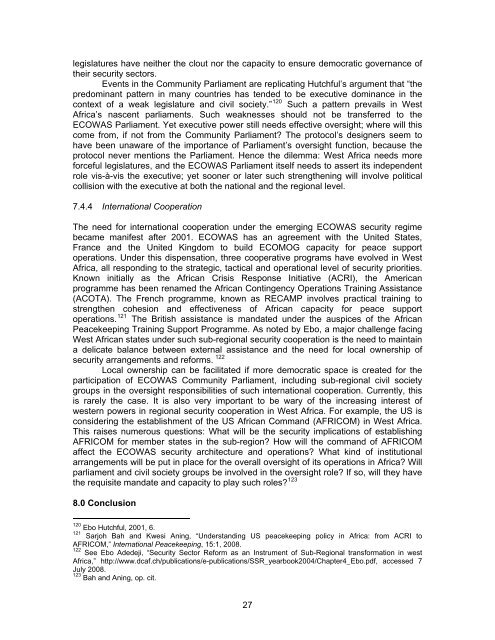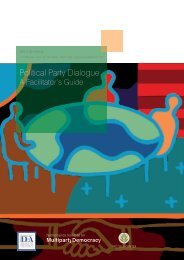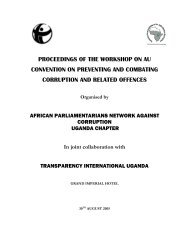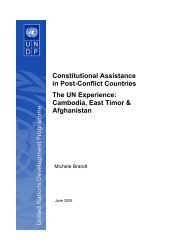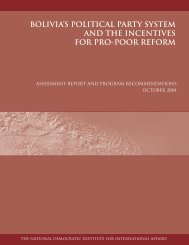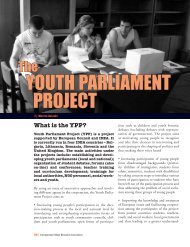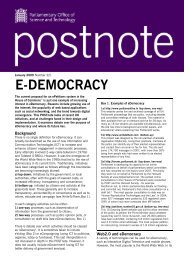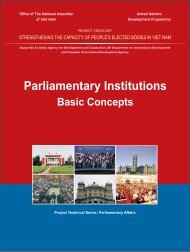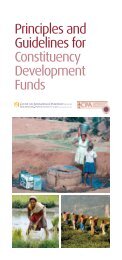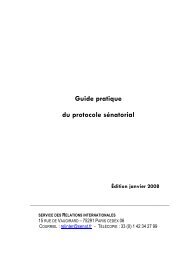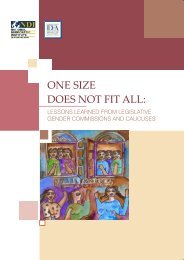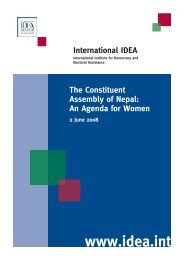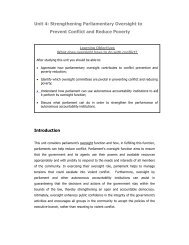Parliamentary Oversight of the Security Sector: Lessons from Ghana
Parliamentary Oversight of the Security Sector: Lessons from Ghana
Parliamentary Oversight of the Security Sector: Lessons from Ghana
You also want an ePaper? Increase the reach of your titles
YUMPU automatically turns print PDFs into web optimized ePapers that Google loves.
legislatures have nei<strong>the</strong>r <strong>the</strong> clout nor <strong>the</strong> capacity to ensure democratic governance <strong>of</strong><strong>the</strong>ir security sectors.Events in <strong>the</strong> Community Parliament are replicating Hutchful’s argument that “<strong>the</strong>predominant pattern in many countries has tended to be executive dominance in <strong>the</strong>context <strong>of</strong> a weak legislature and civil society.” 120 Such a pattern prevails in WestAfrica’s nascent parliaments. Such weaknesses should not be transferred to <strong>the</strong>ECOWAS Parliament. Yet executive power still needs effective oversight; where will thiscome <strong>from</strong>, if not <strong>from</strong> <strong>the</strong> Community Parliament? The protocol’s designers seem tohave been unaware <strong>of</strong> <strong>the</strong> importance <strong>of</strong> Parliament’s oversight function, because <strong>the</strong>protocol never mentions <strong>the</strong> Parliament. Hence <strong>the</strong> dilemma: West Africa needs moreforceful legislatures, and <strong>the</strong> ECOWAS Parliament itself needs to assert its independentrole vis-à-vis <strong>the</strong> executive; yet sooner or later such streng<strong>the</strong>ning will involve politicalcollision with <strong>the</strong> executive at both <strong>the</strong> national and <strong>the</strong> regional level.7.4.4 International CooperationThe need for international cooperation under <strong>the</strong> emerging ECOWAS security regimebecame manifest after 2001. ECOWAS has an agreement with <strong>the</strong> United States,France and <strong>the</strong> United Kingdom to build ECOMOG capacity for peace supportoperations. Under this dispensation, three cooperative programs have evolved in WestAfrica, all responding to <strong>the</strong> strategic, tactical and operational level <strong>of</strong> security priorities.Known initially as <strong>the</strong> African Crisis Response Initiative (ACRI), <strong>the</strong> Americanprogramme has been renamed <strong>the</strong> African Contingency Operations Training Assistance(ACOTA). The French programme, known as RECAMP involves practical training tostreng<strong>the</strong>n cohesion and effectiveness <strong>of</strong> African capacity for peace supportoperations. 121 The British assistance is mandated under <strong>the</strong> auspices <strong>of</strong> <strong>the</strong> AfricanPeacekeeping Training Support Programme. As noted by Ebo, a major challenge facingWest African states under such sub-regional security cooperation is <strong>the</strong> need to maintaina delicate balance between external assistance and <strong>the</strong> need for local ownership <strong>of</strong>security arrangements and reforms. 122Local ownership can be facilitated if more democratic space is created for <strong>the</strong>participation <strong>of</strong> ECOWAS Community Parliament, including sub-regional civil societygroups in <strong>the</strong> oversight responsibilities <strong>of</strong> such international cooperation. Currently, thisis rarely <strong>the</strong> case. It is also very important to be wary <strong>of</strong> <strong>the</strong> increasing interest <strong>of</strong>western powers in regional security cooperation in West Africa. For example, <strong>the</strong> US isconsidering <strong>the</strong> establishment <strong>of</strong> <strong>the</strong> US African Command (AFRICOM) in West Africa.This raises numerous questions: What will be <strong>the</strong> security implications <strong>of</strong> establishingAFRICOM for member states in <strong>the</strong> sub-region? How will <strong>the</strong> command <strong>of</strong> AFRICOMaffect <strong>the</strong> ECOWAS security architecture and operations? What kind <strong>of</strong> institutionalarrangements will be put in place for <strong>the</strong> overall oversight <strong>of</strong> its operations in Africa? Willparliament and civil society groups be involved in <strong>the</strong> oversight role? If so, will <strong>the</strong>y have<strong>the</strong> requisite mandate and capacity to play such roles? 1238.0 Conclusion120 Ebo Hutchful, 2001, 6.121 Sarjoh Bah and Kwesi Aning, “Understanding US peacekeeping policy in Africa: <strong>from</strong> ACRI toAFRICOM,” International Peacekeeping, 15:1, 2008.122 See Ebo Adedeji, “<strong>Security</strong> <strong>Sector</strong> Reform as an Instrument <strong>of</strong> Sub-Regional transformation in westAfrica,” http://www.dcaf.ch/publications/e-publications/SSR_yearbook2004/Chapter4_Ebo.pdf, accessed 7July 2008.123 Bah and Aning, op. cit.27


